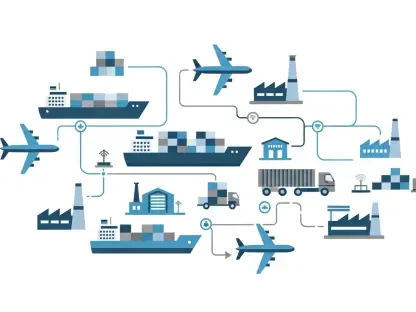Prof. Ransford E. V. Gyampo embarks on a strategic initiative to reduce air freight costs, aiming to enhance commercial shipping operations in Ghana. As the CEO of the Ghana Shippers’ Authority (GSA), Prof. Gyampo is dedicated to fostering cost-effective practices in collaboration with stakeholders at Kotoka International Airport. With the nation’s economic vibrancy closely tied to shipping efficacy, his mission addresses a pressing need for optimization within the sector.
Strategic Initiatives and Stakeholder Engagement
Collaboration for Cost Reduction
In the modern commercial landscape, air freight operations are an indispensable element in the logistical framework, and Ghana stands at a crossroads where effective collaboration forms a keystone for success. Prof. Gyampo actively works to bridge divides among shippers, service providers, and government agencies. This cooperative spirit seeks to revamp the existing regulatory framework, addressing barriers that often disrupt operational fluidity. It is imperative that shippers and associated parties move forward with a unified approach to facilitate efficiency and reduce costs. Recognizing the interdependency inherent within supply chains, Prof. Gyampo emphasizes the collective effort needed to dismantle logistical bottlenecks that inflate operational costs.
Legislative Integration
Legislation acts as a backbone, integrating operational standards into laws that govern and streamline the business environment. Prof. Gyampo’s initiatives highlight the importance of embedding robust protocols within legislative frameworks. This strategy fosters a landscape conducive to economic growth by eliminating bureaucratic red tape and fostering transparency. The seamless fusion between operational practices and legal standards is crucial for nurturing a sustainable business ecosystem. Prof. Gyampo advocates for legislative enhancements that support the intricacies of air freight operations. Encouraging forward-thinking policies serves as a catalyst for proficient, methodical engagement in shipping practices.
Partnerships and Industry Commitment
Strengthening Industry Ties
Cementing alliances within the industry serves as a vital strategy for positioning Ghana on the global shipping stage. Prof. Gyampo’s engagement with key players, such as Aviance Ghana and Swissport Ghana, underscores a shared commitment to bolstering the country’s international presence. These partnerships echo a mutual willingness to drive benefits across economic circles through enhanced industry collaboration. Mark Kamis of Aviance Ghana articulates a proactive stance in nurturing ties with the GSA, reflecting broader industry sentiment geared towards constructive engagement. Commitment from a range of stakeholders underscores Prof. Gyampo’s vision to propel Ghana’s economic activity and global visibility, advocating for collaborative growth.
Addressing Sector Challenges
Despite strides in partnership building, significant challenges hinder air freight operations, demanding concerted effort for sustainable solutions. Swissport Ghana’s Managing Director, Mr. Gerald Suckling, reveals obstacles such as volatile economic conditions impacting production variability, from perishable to durable goods. These fluctuations, coupled with procedural delays, highlight a prevalent issue meriting urgent attention. Effective stabilization efforts necessitate synchronized action among stakeholders to mitigate disruptions that impair sector performance. By focusing on pragmatic solutions and fostering resilience, Prof. Gyampo aims to counter these hurdles, instilling stability and efficiency within air freight operations.
Operational Inefficiencies and Systemic Issues
IT and Infrastructure Concerns
Robust IT infrastructure is imperative for seamless air freight operations, yet lapses within systems like the Integrated Customs Management System (ICUMS) accentuate costly inefficiencies. Frequent breakdowns in ICUMS result in delays that inflate expenses, underscoring an urgent need for technical revamp. Freight forwarders express concerns regarding these failures, emphasizing the importance of reliable systems to streamline customs processes. Addressing technology deficiencies is vital for minimizing bottlenecks and optimizing flow within air freight logistics. Enhanced focus on infrastructure improvements underpins Prof. Gyampo’s strategy to curb procedural delays and bolster efficiency.
Procedural Delays and Corruption
Inefficiencies arising from state agency operations pose critical barriers to air freight fluidity. Discrepancies in weight during shipment clearance reflect broader procedural hiccups that foster corruption and poor performance due to delayed services. Such irregularities hinder progress, prompting stakeholders to advocate for systemic reviews and stringent oversight to promote transparency. The necessity for continuous improvement within operational practice remains at the forefront of discussions as stakeholders strive to eliminate corruption and enhance procedural effectiveness. Emphasizing clear, fair procedures is fundamental to refining sector operability and achieving optimal outcomes.
Strategic Solutions and Advocacy
Prof. Ransford E. V. Gyampo, who serves as the CEO of the Ghana Shippers’ Authority (GSA), is spearheading a strategic initiative aimed at reducing air freight costs to bolster commercial shipping operations in Ghana. By coordinating with various stakeholders at Kotoka International Airport, Prof. Gyampo seeks to implement cost-effective practices that will significantly impact the efficiency and affordability of shipping processes throughout the nation. Recognizing that Ghana’s economic vibrancy is intricately linked to the efficacy of its shipping sector, this initiative addresses an urgent need for optimization and improvement. The endeavor promises to strengthen Ghana’s logistics infrastructure, enabling smoother trade flows and more competitive positioning within the global market. As the country strives to elevate its economic standing, Prof. Gyampo’s leadership is pivotal in ensuring that shipping operations are both sustainable and forward-thinking.









